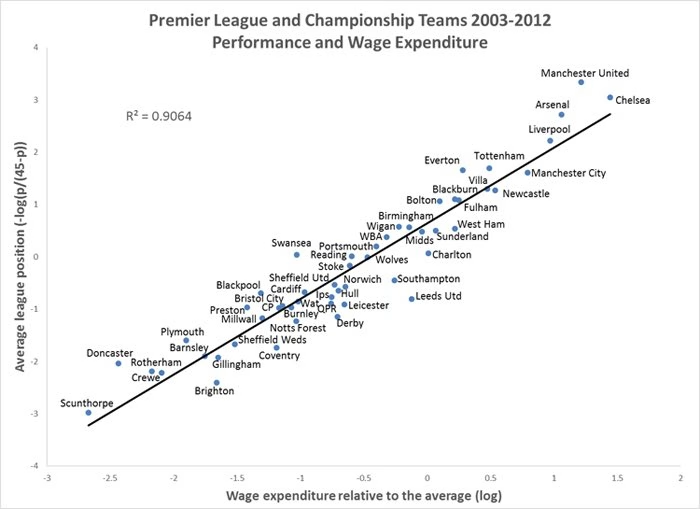How to win the Premier League
As the new season is upon us all football fans up and down the country will no doubt have fresh hopes about what the season will bring. Transfers have been done and hope raised. But what is it that makes a team successful? What is the most defining characteristic?
The defining characteristic
It’s well known that clubs spend a significant portion of their revenue on wages to attract top players, hoping that buying talent translates into better performances.
Years ago, I set out to predict promotions and relegations using complex maths, but then it struck me—maybe wages were directly correlated to performance. If so, higher wage bills should correlate with higher league positions, and lower ones with the bottom of the table.
After extensive data analysis, I discovered a strong correlation between wages and final league positions. Essentially, the teams with the highest wage bills consistently ended up at the top, while those with the lowest often found themselves relegated. The big four clubs, with the highest wage bills, regularly finished in the top four, while the teams with the lowest wages typically ended up at the bottom. This pattern repeats season after season with remarkable consistency.
A modern measure
Since I first started using wages as a proxy for predicting final league positions, things have evolved. Now, there are websites dedicated to tracking transfers and estimating player values, offering a clear snapshot of each team’s relative strength.
Before each season, I like to browse through sites like Transfermarkt to get a sense of the league dynamics.
It’s all relative
Wage bills have skyrocketed over the years, so it’s not enough just to spend money—you have to outspend your rivals at a faster rate. The average weekly wage for a top-tier footballer has risen 100-fold in 30 years. If your club hasn’t increased its wage bill by the same amount, it’s in relative decline.
In contrast, lower league teams have seen wages increase by less than five times over the same period, highlighting the massive disparity between lower league football and the top tier.
Measuring wage bills by “market share” offers a clearer view of each club’s position. For example, Chelsea outspent others significantly for a few years but has since fallen back. Arsenal fans, though frustrated, can take some comfort in the fact that their club is gaining ground, even if they’ve been outperformed by lower-spending teams recently.

Outperformance relative to spend
Interestingly, under-performers tend to cluster just outside the top four to mid-ranking spenders. I need to research more to understand why, but teams in this range often perform poorly relative to their spending. On the other hand, over-performers are usually found in the lower part of the league. In the middle, it averages out into a battle for points, consistency, and mid-table obscurity.
Each season typically has one significant over- or under-performer, but overall, it seems that money does buy success. This trend allows for fairly accurate forecasts of a club’s long-term success or failure based on wage spending. Wages are a strong indicator of how well a club should perform, which also has implications for assessing a manager’s performance. By comparing relative performance, we can better judge who is truly achieving above their means.
Using this information
How can you best use this information?
From a betting or trading perspective, it’s valuable for anticipating whether a team is performing above or below expectations. This insight can help you predict if a team is likely to gain or lose points as the season progresses. I often focus on promotion and relegation markets, where you can find real value by taking positions throughout the season and letting things play out as expected.
Before and during the season, keep an eye on the news from each club. If a club is struggling financially, their league prospects are likely to decline. Conversely, a team with deep pockets is more likely to improve its standing.
New managers can rejuvenate a team and bring them back to their expected level, but there’s little evidence they can push them far beyond it. When popular managers resign, it can have the opposite effect. With betting exchanges, you can capitalise on temporary successes or failures by backing or laying a team and then trading out when they regress to their expected position. You can also take long-term positions and benefit from the increasing certainty or uncertainty as the season unfolds.
Summary
At its core, the economics of football is pretty grim.
Wage-related costs are so high that many aspiring clubs have to sell their best players just to stay afloat. But selling top talent often leads to poorer results, creating a catch-22 situation.
This can be frustrating for fans who watch a homegrown player rise through the ranks, only to be sold to a rival. Big clubs often buy up the best players from smaller teams, maintaining a tight grip on talent. With few restrictions in place, money seems to be the only limit.
So, keep your expectations realistic, but most importantly, enjoy the upcoming Premier League season!